人教版(2019)英语必修第一册 Welcome unit Discovering useful structures句子成分课件 (共27张PPT)
文档属性
| 名称 | 人教版(2019)英语必修第一册 Welcome unit Discovering useful structures句子成分课件 (共27张PPT) | 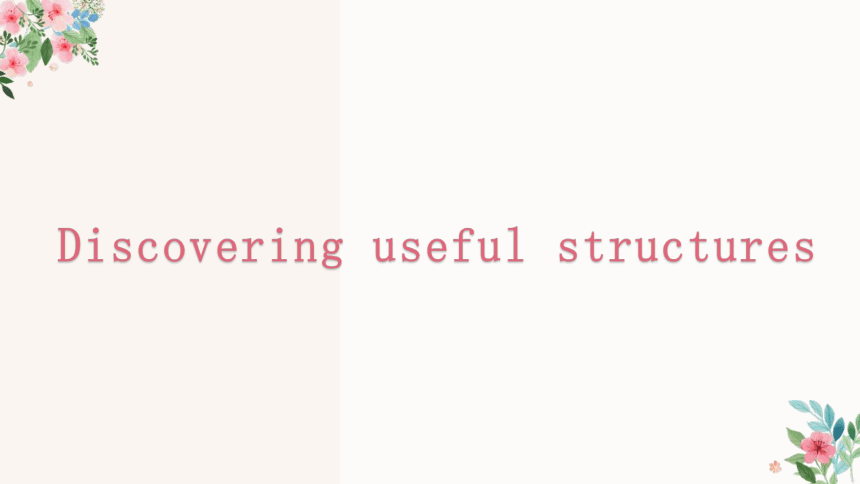 | |
| 格式 | pptx | ||
| 文件大小 | 940.3KB | ||
| 资源类型 | 教案 | ||
| 版本资源 | 人教版(2019) | ||
| 科目 | 英语 | ||
| 更新时间 | 2020-09-20 11:33:40 | ||
图片预览

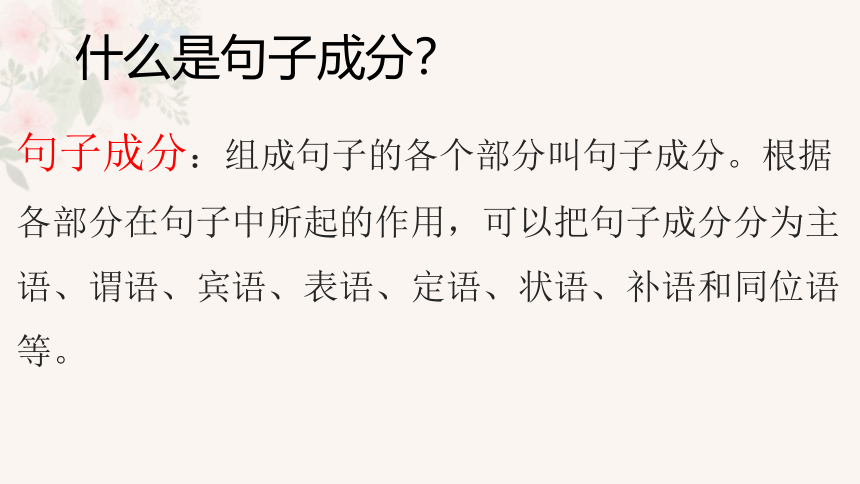
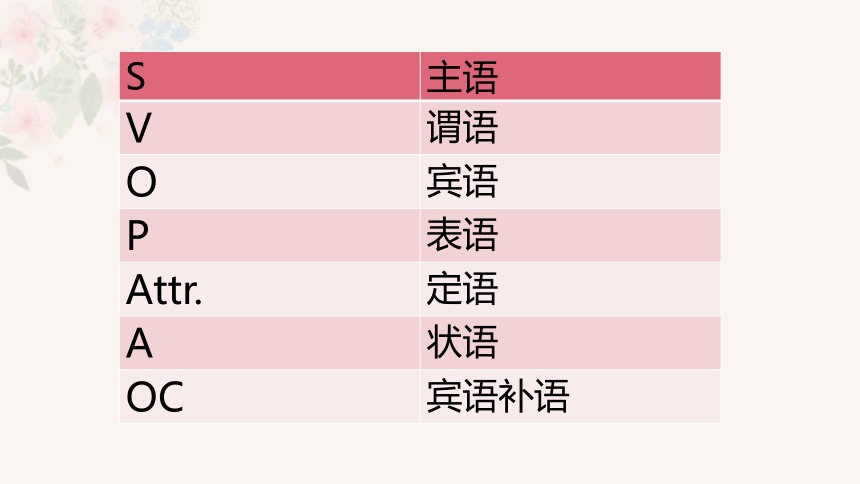
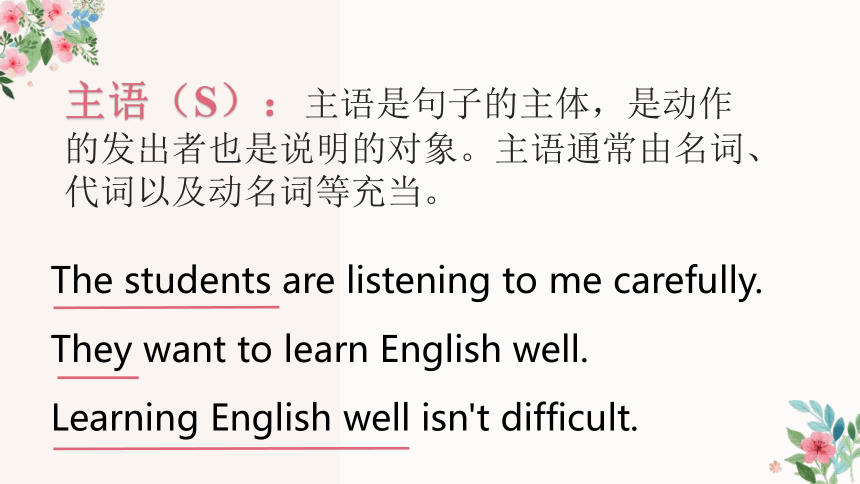

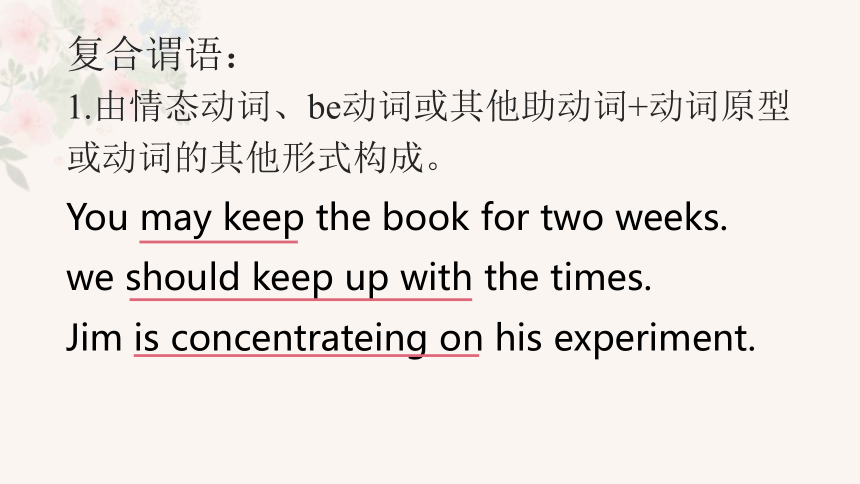
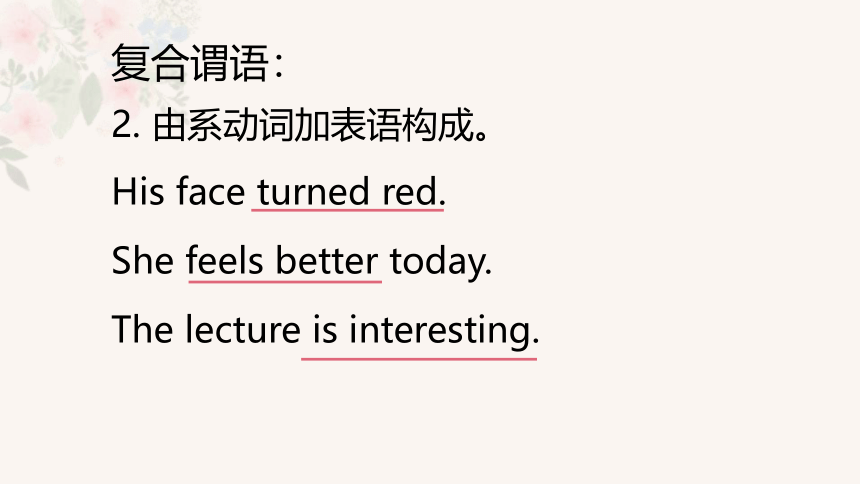
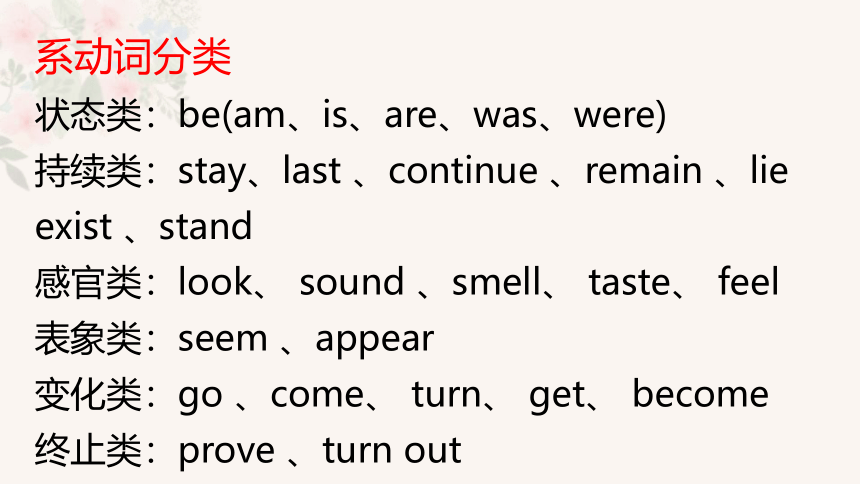
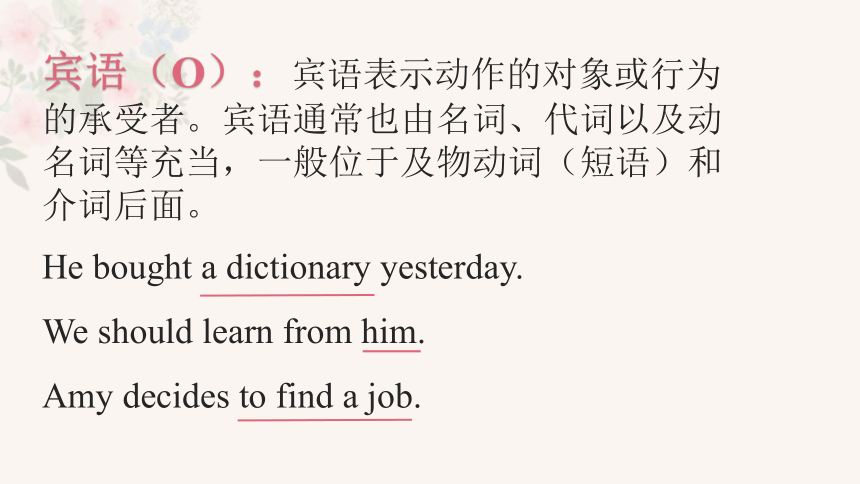
文档简介
Discovering useful structures
句子成分:组成句子的各个部分叫句子成分。根据各部分在句子中所起的作用,可以把句子成分分为主语、谓语、宾语、表语、定语、状语、补语和同位语等。
什么是句子成分?
{5C22544A-7EE6-4342-B048-85BDC9FD1C3A}S
主语
V
谓语
O
宾语
P
表语
Attr.
定语
A
状语
OC
宾语补语
主语(S):主语是句子的主体,是动作的发出者也是说明的对象。主语通常由名词、代词以及动名词等充当。
The students are listening to me carefully.
They want to learn English well.
Learning English well isn't difficult.
谓语(V):谓语是用来说明主语的行为动作或状态。谓语通常由动词构成。有简单谓语和复合谓语之分。
简单谓语:由实义动词或实义动词短语构成。
She likes singing.
He runs every morning.
Tom is fond of playing basketball.
复合谓语:
1.由情态动词、be动词或其他助动词+动词原型或动词的其他形式构成。
You may keep the book for two weeks.
we should keep up with the times.
Jim is concentrateing on his experiment.
复合谓语:
2. 由系动词加表语构成。
His face turned red.
She feels better today.
The lecture is interesting.
系动词分类
状态类:be(am、is、are、was、were)
持续类:stay、last 、continue 、remain 、lie exist 、stand
感官类:look、 sound 、smell、 taste、 feel
表象类:seem 、appear
变化类:go 、come、 turn、 get、 become
终止类:prove 、turn out
宾语(O):宾语表示动作的对象或行为的承受者。宾语通常也由名词、代词以及动名词等充当,一般位于及物动词(短语)和介词后面。
He bought a dictionary yesterday.
We should learn from him.
Amy decides to find a job.
双宾语:直接宾语(DO)+间接宾语(IO)。直接宾语一般指的是动词所涉及的物,间接宾语一般是指承受动词所表示行为的人。间接宾语一般置于直接宾语之前。
He gives a lecture to us.
My mother bought me a gift.
He even told us a funny story.
DO
IO
IO
DO
IO
DO
表语(P):表语是用来说明主语的性质、特征、状态或身份,与系动词一起构成复合谓语。表语通常由名词、代词、形容词、副词、数词、介词短语、动词不定式等充当。
I feel much better now.
He became a scientist.
This is an English-Chinese dictionary.
定语(Attr.):定语起修饰、限定名词或代词的作用,可谓前置定语和后置定语。一般由名词、形容词、数词、介词短语、动词不定式、分词等充当。
Changsha is a beautiful city.
He is an exchange student.
The girl in red is my sister.
I have a lecture to attend.
状语(A):状语用来修饰动词、形容词、副词或整个句子,说明动作或状态特征。可表示时间、地点、条件、让步、方式等。
I'll be back in a while.
Please call me if you need help.
THey met each other in the park yesterday.
宾语补足语(OC):有些及物动词的宾语后需添加部分内容对宾语进行补充说明,这一部分内容称为宾语补足语。宾语补足语可由名词、形容词、副词、不定式、分词等充当。
We must keep it a secret.
He saw her entering the room.
I found my classmates friendly and helpful.
主动语态变被动语态后,宾语补足语就变成主语补足语。
什么是基本句子结构?
句子结构:英语基本句子结构可归纳为八种基本句式,句子可以在此基础上扩大、组合、省略和倒装。掌握这八个基本句式是掌握英语句子结构的基础。
八大基本句式
1.主语+谓语
2.主语+谓语+状语
3.主语+谓语+宾语
4.主语+谓语+宾语+状语
5.主语+谓语+间接宾语+直接宾语
6.主语+谓语+宾语+宾语补足语
7.主语+系动词+表语
8.There be句型
1.主语+谓语(S+V)
这种句型中的动词是不及物动词。所谓不及物动词,就是后面不可以直接加宾语的动词。常见的不及物动词有work 、jump 、arrive、come、disappear 、cry、happen 、die等
Class begins.
You jump; I jump.
The rain stopped.
2.主语+谓语+状语(S+V+A)
在很多情形中,做谓语的不及物动词后面跟上状语意思才完整。
The pen writes smoothly.
The sun rises in the east.
The accident happened yesterday.
3.主语+谓语+宾语(S+V+O)
这种句型中的动词不能表达完整的意思,必须跟一个宾语,才能使意思完整。
Who knows the answer?
He enjoys reading.
My sister is writing a letter.
4.主语+谓语+宾语+状语(S+V+O+A)
有些及物动词做谓语时,加上宾语意思仍不完整,后面跟上状语意思才完整。
He put the coffee on the table.
Peter plays games on the phone.
I need you when I feel lonely.
5.主语+谓语+间接宾语+直接宾语(S+V+IO+DO)
有些谓语动词必须跟两个宾语才能表达完整的意思。这两个宾语通常一个为间接宾语(指人);一个为直接宾语(指物)。常见接双宾语的动词有give、lend、 offer、 show、 tell 、buy 、bring 、get
He gave me a book.
He showed me how to use it.
My mother bought me a dictionary.
6.主语+谓语+宾语+宾语补足语
(S+V+O+OC)
这种句型中的动词虽然是及物动词,但是只跟一个宾语不能表达完整的意思,必须加上一个补充成分说明宾语,才能使其意思完整。
I heard him singing a song.
They painted the door green.
He asked me to come back soon.
7.主语+系动词+表语(S+P)
这种句型侧重说明主语的特征、身份等,谓语动词需要用系动词。常见的系动词有be、look、smell 、taste 、become、 get 、turn 、remain
You look great.
We became friends.
The dishes tastes very dilicious.
The compition turned interesting.
8.There be句型
There be结构表示“某地有某物”,所以通常被称为存在句。其中,be为谓语动词,there be 后面的名词为句子的主语。be动词还可已用其他词代替,如live、exist、stand、lie、remain、go、come
There stands a tower in the mountain.
There are many students in the classroom.
There exists different opinions on the question.
判断下列句子的基本结构
1.The bread tastes delicious.
2.I will spend the summer holiday in the village.
3.He bought me a birthday present.
4.I could not make him change his mind.
5.We finished our homework.
6.He got up very late.
7.There is some milk in the bottle.
8.The baby cried.
1.The bread tastes delicious.
2.I will spend the summer holiday in the village.
3.He bought me a birthday present.
4.I could not make him change his mind.
S
P
A
O
V
S
OC
O
V
S
V
S
O
OC
5.We finished our homework.
6.He got up very late.
7.There is some milk in the bottle.
8.The baby cried.
V
There be
A
V
S
O
V
S
S
句子成分:组成句子的各个部分叫句子成分。根据各部分在句子中所起的作用,可以把句子成分分为主语、谓语、宾语、表语、定语、状语、补语和同位语等。
什么是句子成分?
{5C22544A-7EE6-4342-B048-85BDC9FD1C3A}S
主语
V
谓语
O
宾语
P
表语
Attr.
定语
A
状语
OC
宾语补语
主语(S):主语是句子的主体,是动作的发出者也是说明的对象。主语通常由名词、代词以及动名词等充当。
The students are listening to me carefully.
They want to learn English well.
Learning English well isn't difficult.
谓语(V):谓语是用来说明主语的行为动作或状态。谓语通常由动词构成。有简单谓语和复合谓语之分。
简单谓语:由实义动词或实义动词短语构成。
She likes singing.
He runs every morning.
Tom is fond of playing basketball.
复合谓语:
1.由情态动词、be动词或其他助动词+动词原型或动词的其他形式构成。
You may keep the book for two weeks.
we should keep up with the times.
Jim is concentrateing on his experiment.
复合谓语:
2. 由系动词加表语构成。
His face turned red.
She feels better today.
The lecture is interesting.
系动词分类
状态类:be(am、is、are、was、were)
持续类:stay、last 、continue 、remain 、lie exist 、stand
感官类:look、 sound 、smell、 taste、 feel
表象类:seem 、appear
变化类:go 、come、 turn、 get、 become
终止类:prove 、turn out
宾语(O):宾语表示动作的对象或行为的承受者。宾语通常也由名词、代词以及动名词等充当,一般位于及物动词(短语)和介词后面。
He bought a dictionary yesterday.
We should learn from him.
Amy decides to find a job.
双宾语:直接宾语(DO)+间接宾语(IO)。直接宾语一般指的是动词所涉及的物,间接宾语一般是指承受动词所表示行为的人。间接宾语一般置于直接宾语之前。
He gives a lecture to us.
My mother bought me a gift.
He even told us a funny story.
DO
IO
IO
DO
IO
DO
表语(P):表语是用来说明主语的性质、特征、状态或身份,与系动词一起构成复合谓语。表语通常由名词、代词、形容词、副词、数词、介词短语、动词不定式等充当。
I feel much better now.
He became a scientist.
This is an English-Chinese dictionary.
定语(Attr.):定语起修饰、限定名词或代词的作用,可谓前置定语和后置定语。一般由名词、形容词、数词、介词短语、动词不定式、分词等充当。
Changsha is a beautiful city.
He is an exchange student.
The girl in red is my sister.
I have a lecture to attend.
状语(A):状语用来修饰动词、形容词、副词或整个句子,说明动作或状态特征。可表示时间、地点、条件、让步、方式等。
I'll be back in a while.
Please call me if you need help.
THey met each other in the park yesterday.
宾语补足语(OC):有些及物动词的宾语后需添加部分内容对宾语进行补充说明,这一部分内容称为宾语补足语。宾语补足语可由名词、形容词、副词、不定式、分词等充当。
We must keep it a secret.
He saw her entering the room.
I found my classmates friendly and helpful.
主动语态变被动语态后,宾语补足语就变成主语补足语。
什么是基本句子结构?
句子结构:英语基本句子结构可归纳为八种基本句式,句子可以在此基础上扩大、组合、省略和倒装。掌握这八个基本句式是掌握英语句子结构的基础。
八大基本句式
1.主语+谓语
2.主语+谓语+状语
3.主语+谓语+宾语
4.主语+谓语+宾语+状语
5.主语+谓语+间接宾语+直接宾语
6.主语+谓语+宾语+宾语补足语
7.主语+系动词+表语
8.There be句型
1.主语+谓语(S+V)
这种句型中的动词是不及物动词。所谓不及物动词,就是后面不可以直接加宾语的动词。常见的不及物动词有work 、jump 、arrive、come、disappear 、cry、happen 、die等
Class begins.
You jump; I jump.
The rain stopped.
2.主语+谓语+状语(S+V+A)
在很多情形中,做谓语的不及物动词后面跟上状语意思才完整。
The pen writes smoothly.
The sun rises in the east.
The accident happened yesterday.
3.主语+谓语+宾语(S+V+O)
这种句型中的动词不能表达完整的意思,必须跟一个宾语,才能使意思完整。
Who knows the answer?
He enjoys reading.
My sister is writing a letter.
4.主语+谓语+宾语+状语(S+V+O+A)
有些及物动词做谓语时,加上宾语意思仍不完整,后面跟上状语意思才完整。
He put the coffee on the table.
Peter plays games on the phone.
I need you when I feel lonely.
5.主语+谓语+间接宾语+直接宾语(S+V+IO+DO)
有些谓语动词必须跟两个宾语才能表达完整的意思。这两个宾语通常一个为间接宾语(指人);一个为直接宾语(指物)。常见接双宾语的动词有give、lend、 offer、 show、 tell 、buy 、bring 、get
He gave me a book.
He showed me how to use it.
My mother bought me a dictionary.
6.主语+谓语+宾语+宾语补足语
(S+V+O+OC)
这种句型中的动词虽然是及物动词,但是只跟一个宾语不能表达完整的意思,必须加上一个补充成分说明宾语,才能使其意思完整。
I heard him singing a song.
They painted the door green.
He asked me to come back soon.
7.主语+系动词+表语(S+P)
这种句型侧重说明主语的特征、身份等,谓语动词需要用系动词。常见的系动词有be、look、smell 、taste 、become、 get 、turn 、remain
You look great.
We became friends.
The dishes tastes very dilicious.
The compition turned interesting.
8.There be句型
There be结构表示“某地有某物”,所以通常被称为存在句。其中,be为谓语动词,there be 后面的名词为句子的主语。be动词还可已用其他词代替,如live、exist、stand、lie、remain、go、come
There stands a tower in the mountain.
There are many students in the classroom.
There exists different opinions on the question.
判断下列句子的基本结构
1.The bread tastes delicious.
2.I will spend the summer holiday in the village.
3.He bought me a birthday present.
4.I could not make him change his mind.
5.We finished our homework.
6.He got up very late.
7.There is some milk in the bottle.
8.The baby cried.
1.The bread tastes delicious.
2.I will spend the summer holiday in the village.
3.He bought me a birthday present.
4.I could not make him change his mind.
S
P
A
O
V
S
OC
O
V
S
V
S
O
OC
5.We finished our homework.
6.He got up very late.
7.There is some milk in the bottle.
8.The baby cried.
V
There be
A
V
S
O
V
S
S
